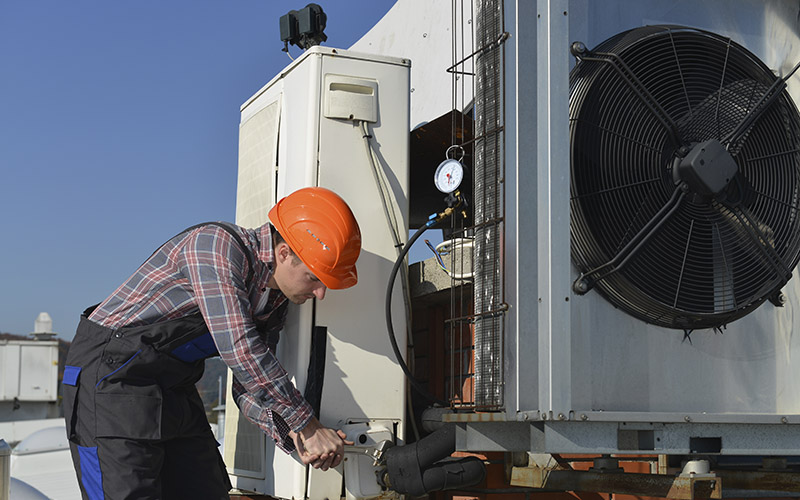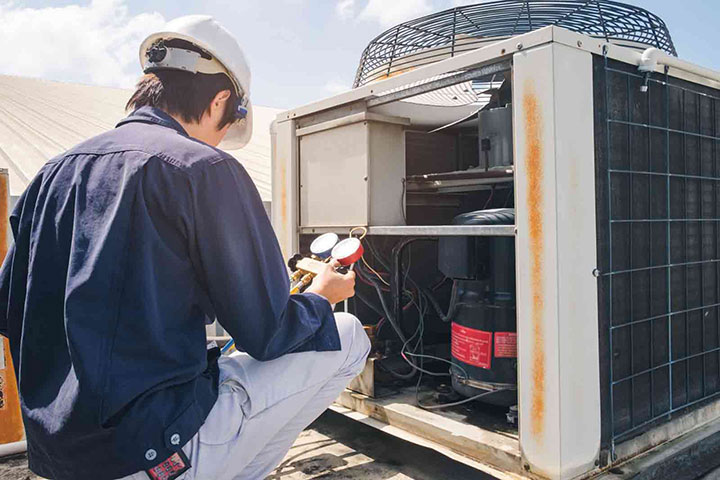Smart Strategies to Make the Most of Your New furnace replacement
Smart Strategies to Make the Most of Your New furnace replacement
Blog Article
Selecting In Between a Warmth Pump and Heating System: Secret Factors To Consider for Your HVAC Requirements
When reviewing home heating choices for HVAC needs, the choice between a heatpump and a heater can be complicated. Each system supplies unique benefits customized to certain climates and power performance goals. Understanding these distinctions is crucial for making an educated choice. Trick aspects such as installment prices and environmental impact even more complicate the choice process. Which choice really straightens with one's comfort and sustainability preferences? The following areas will certainly check out these considerations thoroughly.
Recognizing Heat Pumps: How They Work and Their Benefits
While several house owners take into consideration different home heating options, understanding exactly how warmth pumps feature and their benefits can considerably influence their choice. Heatpump run by transferring warmth as opposed to generating it. In the winter months, they remove heat from the outside air or ground and transfer it inside your home, while in the summer, they reverse this process, cooling the home by getting rid of warm outside. This dual performance makes them flexible for year-round climate control.One of the key advantages of heatpump is their energy effectiveness. They make use of considerably much less electrical energy compared to conventional heater, potentially resulting in reduced utility bills (ductless mini splits). Furthermore, heatpump have a smaller carbon impact, making them an eco friendly selection. They additionally require much less upkeep than conventional systems, adding to lasting cost financial savings. In general, comprehending the mechanics and benefits of heatpump can assist homeowners make educated decisions regarding their heating and cooling down requirements
Exploring Heating Systems: Types, Procedure, and Benefits
Furnaces can be found in numerous types, including gas, electric, and oil designs, each with distinctive operational mechanisms. Understanding these distinctions is crucial, as they influence efficiency and heating efficiency. Additionally, heaters supply numerous advantages, such as consistent heat outcome and reliability in chillier climates.
Types of Heaters
Heating systems can vary substantially in style and procedure, with furnaces being a prominent selection among property owners. There are numerous types of heating systems, each making use of various fuel resources and technologies. Gas heaters prevail, leveraging gas to produce warmth successfully. Electric heaters, on the various other hand, make use of electric resistance to produce heat, typically favored for their straightforward installment. Oil heating systems, while less usual, are efficient in locations with restricted gas access (heat pump installation ooltewah tn). In addition, condensing heaters make best use of power efficiency by recycling and capturing exhaust gases. Each type operates via a system of warm exchangers and ductwork to disperse cozy air throughout a home. Comprehending the differences between these furnace types is vital for educated heating and cooling decisions
Benefits of Heaters
For home owners seeking dependable warmth throughout chilly months, the benefits of furnaces are substantial. Heating systems supply regular home heating, ensuring even temperatures throughout the home. They are specifically reliable in extreme cool, often outperforming heatpump in icy conditions. Various kinds, including gas, electrical, and oil furnaces, supply versatility to fulfill diverse needs and preferences.Furnaces also have a tendency to have lower initial installment expenses contrasted to heat pumps, making them an extra available choice for lots of. Their durable layout adds to a longer life-span, with numerous units lasting over 15 years with appropriate upkeep. Additionally, contemporary heaters are typically outfitted with advanced innovation for boosted performance, which can result in decreased energy costs. On the whole, furnaces remain a reputable choice for reliable home heating.

Power Performance: Contrasting Heat Pumps and Furnaces
When contrasting energy efficiency between heatpump and heaters, the Seasonal Energy Effectiveness Proportion (SEER) plays an essential function in figuring out efficiency. Furthermore, an operational cost evaluation reveals the lasting financial effects of each system. Recognizing these factors can guide home owners in making educated choices about their home heating remedies.
Seasonal Energy Effectiveness Proportion
Energy performance plays an important duty in the decision-making process between heatpump and furnaces, especially when considering the Seasonal Power Efficiency Ratio (SEER) This metric steps the cooling efficiency of heatpump over an entire air conditioning season, offering a standard means to assess efficiency. Greater SEER ratings show greater power performance, converting to lower power consumption and minimized utility bills. In comparison, heating systems are generally analyzed making use of the Yearly Fuel Utilization Performance (AFUE) score, which mirrors heating performance. When comparing these 2 systems, homeowners must prioritize SEER ratings for warmth pumps, as they directly effect overall power savings and environmental sustainability. A detailed understanding of SEER can especially affect the long-term satisfaction and cost-effectiveness of the picked heating and cooling service.
Operational Price Analysis
Comprehending the functional expenses related to warm pumps and furnaces is essential for house owners examining their options. Warmth pumps normally provide higher power efficiency, transforming electric energy into heat with marginal waste. This results in lower month-to-month energy costs, specifically in moderate climates. Alternatively, traditional furnaces, especially gas versions, may have reduced ahead of time prices yet can incur greater functional expenditures over time as a result of sustain rates and efficiency ratings.Moreover, heat pumps can work as both home heating and cooling down systems, possibly reducing the demand for separate heating and cooling units. While preliminary financial investments for heatpump may be greater, their long-lasting financial savings in energy effectiveness can make them an extra affordable selection for lots of households. Careful evaluation of regional power prices is vital to figure out the best option.
Installment Prices: What to Anticipate for Each Furnace
Installment expenses for home heating systems can differ significantly in between heat pumps and furnaces, affecting home owners' choices. Heatpump normally have higher in advance installment costs, usually ranging about his from $3,500 to $8,000, depending on the device dimension and complexity of setup. This consists of the exterior unit, indoor handling system, and essential ductwork adjustments. Alternatively, heaters have a tendency to have lower initial prices, averaging in between $2,500 and $6,000, which can be appealing for budget-conscious property owners. Setup expenditures can enhance if considerable ductwork is required.Moreover, the choice of gas kind for heaters-- all-natural gas, gas, or electrical-- can likewise impact setup costs. While warm pumps offer energy performance, their preliminary financial investment might deter some purchasers. Inevitably, evaluating setup costs along with lasting cost savings and effectiveness will certainly aid house owners in making informed decisions regarding their home heating systems.
Climate Considerations: Which System Executes Much Better in Your Location
Just how do climate problems affect the performance of heater? The efficiency of heat pumps and furnaces can vary greatly depending on the neighborhood environment. In modest climates, heat pumps excel by successfully moving warmth from the outside air, making them an energy-saving alternative. Nevertheless, their efficiency reduces in exceptionally cool temperatures, where they might battle to draw out adequate warm. On the other hand, heating systems, specifically gas versions, supply constant and reliable warm regardless of outdoor conditions, making them more suitable in colder regions.In areas that experience milder winters, heat pumps can operate properly year-round, providing both cooling and heating. On the other hand, areas with harsh wintertimes frequently take advantage of the toughness of heaters. Ultimately, comprehending the local environment is essential when deciding between a heatpump and a furnace, as it directly influences their functional effectiveness and total performance.
Maintenance Needs: Long-Term Look After Warm Pumps vs. Furnaces
While both heat pumps and heating systems need regular maintenance to assure peak performance, their details requirements and treatment routines vary considerably. Heating systems commonly need less constant attention, with yearly assessments being sufficient to look for gas leakages, clean filters, and evaluate general capability. Their easier design often enables uncomplicated repairs.In comparison, heatpump demand semiannual upkeep due to their dual function in cooling and heating. This consists of cleansing coils, examining refrigerant degrees, and ensuring that both the interior and exterior systems operate at their best. In addition, heat pump upkeep often involves even more intricate parts, making professional maintenance essential.Neglecting maintenance can result in reduced efficiency and raised power expenses for both systems. Eventually, house owners must think about these long-lasting care needs when selecting between a heatpump and a heater, as aggressive maintenance can prolong the lifespan and efficiency of either system substantially.
Ecological Impact: Picking a Lasting Heating Choice
The environmental effect of furnace is an important analysis for property owners looking for sustainable choices. Warm pumps are typically extra energy-efficient than standard heating systems, as they transfer heat rather than produce it, significantly minimizing carbon exhausts. By utilizing renewable resource sources, such as geothermal or air-source warm pumps, house owners can even more reduce their eco-friendly footprint.On the various other hand, natural gas heaters give off greenhouse gases and add to air contamination, though they usually give higher warm output. Innovations in technology have actually led to the growth of high-efficiency heaters that minimize emissions.Ultimately, choosing a heating system entails weighing performance versus environmental impact. Homeowners are motivated to assess neighborhood power resources and motivations for sustainable systems, making sure a selection that aligns with both individual convenience and ecological responsibility. The choice impacts not only prompt convenience however additionally lasting sustainability and environmental wellness.
Regularly Asked Questions
The Length Of Time Do Heat Pumps and Furnaces Normally Last?
The life-span of heat pumps generally ranges from 15 to twenty years, while heating systems can last between 15 to three decades. Routine maintenance substantially influences their long life and efficiency in supplying home heating solutions.
Can I Make Use Of a Heat Pump in Incredibly Cold Climates?
Heatpump can operate in exceptionally chilly environments, yet their performance lessens as temperatures decline. In such problems, additional home heating resources may be essential to preserve comfy interior temperatures and guarantee peak efficiency.

What Is the Noise Degree of Heat Pumps Versus Furnaces?
The noise levels of heatpump and furnaces differ significantly. Normally, heatpump run even more quietly than conventional heating systems, making them more suitable for those delicate to sound, while furnaces might create louder functional check my blog sounds during home heating cycles.
Are Warmth Pumps Suitable for Both Cooling And Heating?
Warmth pumps are without a doubt appropriate for both home heating and air conditioning (heat pump service). They operate by moving heat, giving efficient temperature control year-round, making them a functional selection for click this property owners looking for an all-in-one heating and cooling solution
What Size Home Heating System Do I Need for My Home?
Figuring out the suitable dimension heating system for a home calls for reviewing aspects such as square video, insulation quality, local climate, and the home's layout. Consulting a specialist can ensure an exact analysis and optimal comfort. Warmth pumps typically use greater energy performance, transforming electrical energy right into heat with minimal waste. In moderate environments, heat pumps succeed by effectively transferring heat from the outdoors air, making them an energy-saving choice. Alternatively, heaters, especially gas models, supply reputable and constant warm no matter of outside conditions, making them better in cooler regions.In locations that experience milder wintertimes, warmth pumps can run successfully year-round, providing both home heating and air conditioning. Warmth pumps are usually extra energy-efficient than typical furnaces, as they move heat rather than generate it, substantially reducing carbon discharges. By using sustainable energy sources, such as geothermal or air-source warmth pumps, home owners can additionally lessen their eco-friendly footprint.On the other hand, natural gas furnaces release greenhouse gases and contribute to air pollution, though they frequently offer greater warmth output.
Report this page